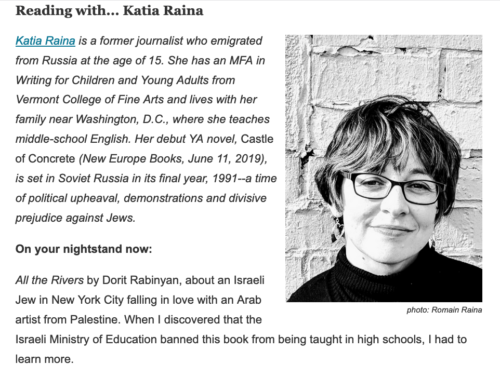My Letter to the Editors of the Shelf Awareness Newsletter
 [Update, 8:00 AM, July 12: Shelf Awareness has included a clarification in today’s newsletter and added one to the archived version of the original interview. I’m grateful.]
[Update, 8:00 AM, July 12: Shelf Awareness has included a clarification in today’s newsletter and added one to the archived version of the original interview. I’m grateful.]
As noted below, I’m an avid reader of the Shelf Awareness newsletters. I was especially intrigued as I began reading this Q&A in the “Pro” issue that I received yesterday morning. (The “Pro” newsletter “provides booksellers and librarians the information they need to sell and lend books. It appears every business day and is read by people throughout the book industry.”) And the featured novel still intrigues me—I’ve placed it on my tbr list, especially as I prepare to teach a course this fall on 21st-Jewish literature (the course will feature a unit on “Newer Immigrant Voices,” including voices that originate in the former Soviet Union).
But I was troubled by something in the author’s very first published response to a Shelf Awareness question. Below is the text the letter (well, the email) that I sent to Shelf Awareness right away. That was 24 hours ago.
I don’t yet see any corrections or clarifications online. Nothing was mentioned in today’s newsletter. But I said what I needed to say. And I’m sharing it.
Dear [Editors]:
As you know, I’m a big fan of the newsletter, especially the “Reading with…” segments. So I hope you won’t mind my sending this quick note.
In today’s Q&A with Katia Raina, Raina says, of Dorit Rabinyan’s All the Rivers (trans. Jessica Cohen—I’m assuming that Raina is referring to the English translation), “When I discovered that the Israeli Ministry of Education banned this book from being taught in high schools, I had to learn more.” Unfortunately, it appears that Raina has not yet learned that “banned” drastically simplifies—if not distorts and misrepresents—what actually happened to the Hebrew version, sound bites notwithstanding.
For a more detailed explanation of what originally occurred in Israel, please see my piece from 2017, which includes these paragraphs:
Consulting Rabinyan’s website again, one reads that the novel “became the center of a political scandal in Israel when the Ministry of Education banned the book from high school’s curriculum.” But the situation, which garnered immediate worldwide attention, was less simple.
The New York Times, for example, reported that the ministry had “decided not to include” Rabinyan’s novel “on the list of required reading for Hebrew high school literature classes.” According to The Times, “teachers had reportedly requested that the book, published in 2014, be included in the recommended curriculum, but a professional committee chose to exclude it.” A ministry official had “said that the book had not been banned, and … did not rule out its inclusion in next year’s list of recommendations.”
Moreover, The Times continued, “after a flurry of protests by high school principals and teachers, the education ministry appeared to partially back away from its decision, saying that teachers could recommend the novel to students in advanced literature classes, but not as part of the regular school curriculum, according to Haaretz, the Israeli daily.” So was the novel “banned”?
Some people may conclude that excluding a novel from a nation-wide required-reading list for high schoolers amounts to “banning” it—even if the book can still be taught on an elective basis. Perhaps Katia Raina is among them. But perhaps she has yet to learn the fuller story. The same may be true for many of Shelf Awareness‘s readers, which is why I’m sending this note.
Thanks so much for taking the time to read my message, and for all of your excellent work.
Yes, “banned” should be changed to “not included in required reading”. Thanks for insisting on getting the truth. And many thanks for posting.
David, check the update at the start of the post.
I’m hoping my synagogue book group will read both of these books next year. I will insert this essay about Rabinyan’s book into our reading.
Where is your group? I would love to sit in on those discussions, if I could! (I’m eager to read Raina’s book, and I was quite impressed by Rabinyan’s.)